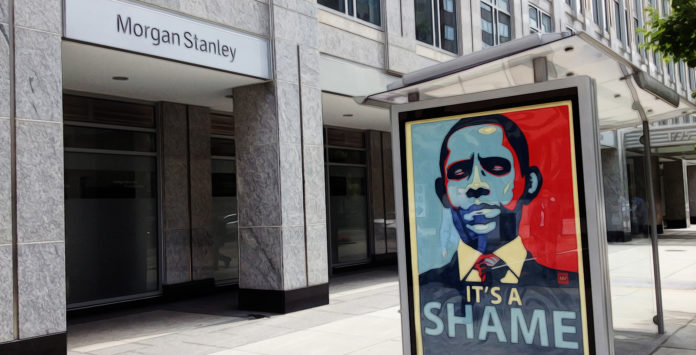
By Claire Bernish at theantimedia.org
In July 2015, Allan Abramson, former federal Senior Executive for the EPA, calculated an estimatefor the Huffington Post of the total cost of the 2008 financial crisis, which ruined millions of people’s lives and threw the global economy into a tailspin: we, the people, lost no less than $1.9 trillion. Additionally, the government, according to Abramson, eventually paid “at least $3.3 trillion.”
But, as the world is keenly cognizant — and in sharp contrast to Iceland’s rational punishment of the criminal element responsible for its financial woes — big banks and the economic henchmen who ran them received at least $3.3 trillion in rewards, er, bailout cash, to ostensibly stay afloat.
As further evidence of the banks’ virtual immunity to punishment for their role in the crisis, the New York Attorney General’s office announced Thursday that Morgan Stanley reached a settlement arrangement with state and federal authorities for a paltry $3.2 billion.
When considering Morgan Stanley’s acknowledged list of offenses agreed to in the deal, it’s questionable whether officials don’t fully comprehend the enormity of the crisis, or simply don’t find its effects on the populace sufficiently grave to tally a more punitive sum — which, of course, could be said of settlements with all big banks complicit in the financial meltdown.
Per the settlement, Morgan Stanley conceded it misrepresented risks and knew the mortgage-backed securitiesit was selling contained “material defects” — including loans deemed “underwater,” where the loan amount had been arbitrarily inflated beyond the value of the property. According to the statement from New York Attorney General Schneiderman:
“In a May 31, 2006 email, the head of Morgan Stanley’s team tasked with doing due diligence on the value of the properties underlying mortgage loans asked a colleague, ‘please do not mention the “slightly higher risk tolerance” in these communications. We are running under the radar and do not want to document these types of things.’
“In another email on November 26, 2006, a member of the Morgan Stanley due diligence team forwarded a list of questionable loans, seeking review and approval to purchase them and adding ‘I assume you will want to do your “magic” on this one?’ In another similar instance from July 2006, the head of Morgan Stanley’s valuation due diligence cleared dozens of risky loans for purchase after less than one minute of review per loan file.”
Under the guidance of the Residential Mortgage-Backed Securities Working Group (RMBS), a joint effort between the Department of Justice and various other federal and state authorities formed in 2012 to investigate those responsible for the crisis, Morgan Stanley is the latest of several banks that have reached settlements.
Citigroup reached a $7 billion agreement, JPMorgan settled for $13 billion, and Bank of America’s settlement, called historic, totaled $16.6 billion, according to the Washington Post. Of course, comparing the these big bank penalties, coupled with their continued enormous profits, to the devastating effects of a $3.3 trillion loss by ordinary families makes the settlements appear to be little more than breadcrumbs.
New York’s plan for the settlement funds tellingly shows how little, if any, those who lost the most will actually benefit.
As the statement explained, Morgan Stanley is required to provide “creditable consumer relief” totaling $400 million “directly” to families across the state. But what constitutes “direct” relief might surprise you:
“Creditable dollars will go toward the creation and preservation of affordable rental housing, land banks, code enforcement, communities purchasing distressed properties, and principal reductions for homeowners.”
While such programs to aid ailing neighborhoods are fundamentally necessary, the meager $400 million allotment seems to be a bit of an insult — and certainly doesn’t directly impact every family who suffered losses in the crisis.
Seven years after the 2008 meltdown, Abramson still had to assert similar sentiment held by much of the country: “The financial industry has to be held accountable for the impact of the crisis.”
With big banks able to negotiate these scant settlement arrangements, it’s likely such assertions will do little more than echo and bounce from building to building down Wall Street.
This article (Morgan Stanley to Pay $3.2 Billion for Costing Americans Trillions) is free and open source. You have permission to republish this article under a Creative Commons license with attribution to Claire Bernish andtheAntiMedia.org. Anti-Media Radio airs weeknights at 11pm Eastern/8pm Pacific. If you spot a typo, email [email protected].




